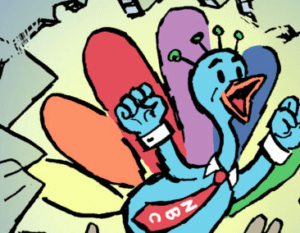 The mobile value proposition of a company like Facebook or Google is fairly straightforward: Download the free app and it’ll let you converse with your friends or give you directions to help you get where you’re going. In return, you allow yourself to be tracked for advertising purposes.
The mobile value proposition of a company like Facebook or Google is fairly straightforward: Download the free app and it’ll let you converse with your friends or give you directions to help you get where you’re going. In return, you allow yourself to be tracked for advertising purposes.
“For carriers, the story is not as clear for the end user yet,” said Ed Ruth, director of new market development, strategic partnerships and innovation at Verizon, speaking at the Open Mobile Summit in San Francisco on Monday.
But that’s changing, Ruth said, and as carriers start developing better quid pro quos, consumers arguably will be more willing to opt into programs that give carriers, and therefore advertisers, greater access to their data.
Verizon has already started down that route with its Smart Rewards loyalty program. Users opt in to allow Verizon to track their behavior and receive more targeted ads through a separate program called Verizon Selects – and in return, users can enroll in Smart Rewards for access to offers, points and other free perks.
When asked to delve more deeply into what Smart Rewards is all about, Ruth chuckled and said he would “gracefully deflect” that particular request. He did, however, note that Verizon is looking to position itself at “the nexus of app discovery and mobile advertising.”
“App developers are struggling to be discovered in one of two stores,” Ruth said, referring in part to the growing price tag associated with cost-per-install (CPI) campaigns on Facebook. Mobile advertising represented about 66% of Facebook’s ad revenue in Q3 2014, up from 49% in Q3 of last year.
Verizon works with a company called Digital Turbine to run CPI campaigns on Verizon devices using an SDK. “It’s a good marriage in terms of taking data and real estate and meeting an opportunity in the market,” Ruth said.
Regarding market opportunities, Sprint is looking for “ways to monetize beyond our current play,” said Wayne Ward, the company’s VP of new product development. Right now, Sprint has its own media platform, Pinsight Media+, which it uses to sell in-app and banner advertising.
One of those ways is to look at mobile as more than just a “piece of real estate,” Ward said. For example, Sprint recently launched Visual Voicemail, which allows consumers to read their voicemails rather than listen to them. Voice recognition technology translates the voicemail messages into text. Users can access the service for free if they opt in to be shown ads, or they can pay for the privilege of an ad-free version.
“We need to go above and beyond selling network access and increased data plans,” Ward said. “It’s about understanding what we have and monetizing beyond the real estate play [in a way] that’s defined by customer preference. When we introduce ads in apps, we’re not just advertising Sprint products, we’re delivering brand advertising within applications. We’re taking every square centimeter of that screen and turning it into a monetization play for ourselves and our business partners.”
On the partnership front, seeming foes can actually be friends – from the right perspective. Take over-the-top (OTT) applications, as in apps or services that bypass traditional distribution channels, like Skype or WhatsApp. On the foe front, OTT apps threaten a carrier’s business by taking advantage of its open environment without giving anything back. But OTT apps are not going away, so why shouldn’t they be an opportunity for both carriers and developers alike? As Ward noted, distribution doesn’t just happen by magic for an OTT app developer.
“OTT providers have to spend on advertising, media and marketing, but what if carriers offered OTT providers a distribution play?” Ward said. “There are 300 million or so active tablet and smartphone devices in the US. Imagine if all of those came preloaded with certain apps? That’s a clear monetization opportunity for both sides to enter into a partnership.”
For the moment, some of these opportunities are theoretical. Mobile has been “a slow nut to crack” and “one of the most underpenetrated areas in terms of ad spend,” said Michael Goo, VP of services and platforms at T-Mobile USA. Privacy is also a sensitive area when it comes to mobile monetization and carriers need to tread carefully, he said,
“Advertisers want to connect with customers and add value, and customers are willing to be contacted and have their location known as long as they receive value along the way,” Goo said. “But we need to respect the customer’s privacy and give customers control over transparency. If we don’t do that, we’ll kill the opportunity.”













